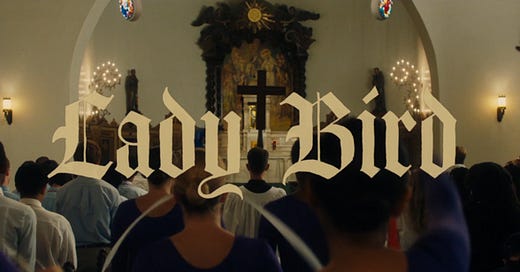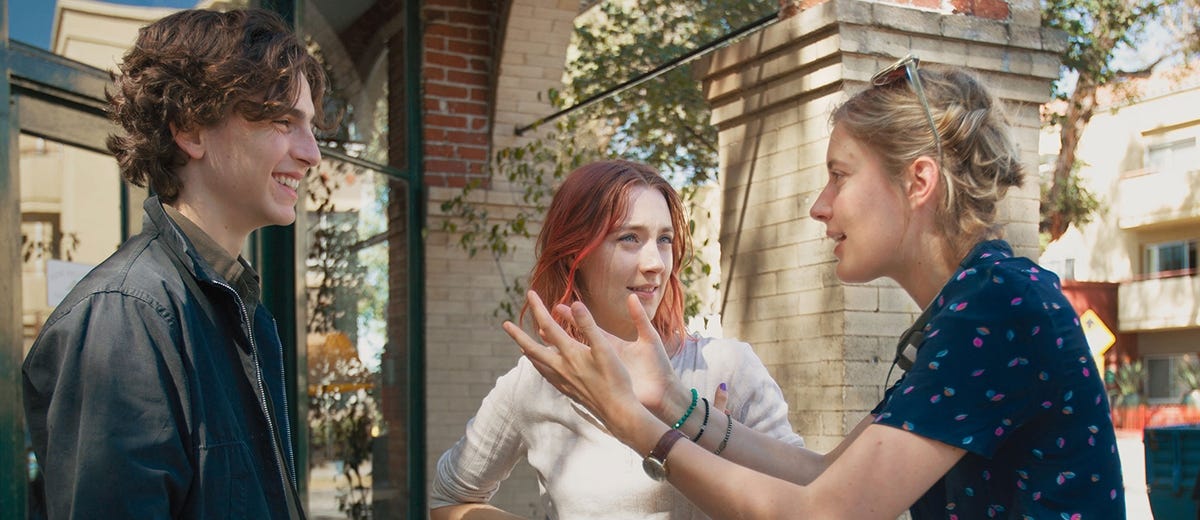This is somehow my most spontaneous newsletter, but also one I have had planned since before I launched in November. When I was writing my original outline back in November, it was the third movie that I knew I wanted to write about at some point — still saving #1 for when it is more timely in October. This is one of my favorite films of all time, and yet it never felt like the right time to write about it. Even this week, I had no intention of writing about it. I was working on a Booksmart/Shiva Baby crossover newsletter for most of the week. As I got closer to wrapping it up, something didn’t feel right about it, and I didn’t love it. On Sunday night, I decided to watch Lady Bird because I was researching Beanie Feldstein — plus, there is literally never a bad time to watch it. As soon as that Joan Didion quote hit, I knew I had to change up my plans and shelf Booksmart for the time being.
This is the film that truly got me into movies to the extent that I am now. I would just go to the movies to enjoy the movie, and that was that. I would think about it a bit after, but not nearly as much as I do now. It made me appreciate the minute details that go into every shot of a film, and it gave me a new appreciation for phenomenal screenplays.
Lady Bird fundamentally altered my taste in movies. It obviously expanded the type of films I watched. For example, I don’t think I would have watched much Noah Baumbach, Eliza Hittman, or Céline Sciamma without this film, but it also somehow changed how I feel about those types of films. Part of it is probably because I saw Lady Bird shortly after moving away to college, a period already ripe with change. Lady Bird made me realize all the things a film could be. It can be a coming of age story while still feeling fresh somehow. It can be a period piece without it feeling dated at all. It can dive into the politics of nearly two decades ago while not being a “political” film. It can be a complex love letter to your hometown. Most importantly, it can be a place where people can see themselves on screen and relate deeply to characters they might have nothing in common that they may not have had a chance to see in the past.
This newsletter is not just about how Lady Bird transformed my own taste; we are also here to look at an outstanding film. This weekend was my 5th or 6th time watching this, and I am still in awe at how perfect the screenplay is. The care to which Gerwig puts into her characters is astounding. I have mentioned this in other places, but it is an interesting exercise to see precisely when Gerwig started working with Noah Baumbach. His first handful of films were good, but looking back at them now, you can tell he does not have the same love and care for his characters as he does in his more recent films. His characters just feel warmer and easier to root for in Frances Ha or The Meyerowitz Stories than in The Squid & The Whale. This obviously isn’t about Baumbach, but that same tenderness and care is evident in Lady Bird.
The attention spent on giving characters as much depth as possible helps the audience root for them. Even a minor character like Shelly, who in a typical film would maybe be given a line or two and just be in the background, is given her own story and helps you better understand Lady Bird and her parents’ situation. The same can be said about Julie, Jenna, Kyle, and Danny. It would have been incredibly easy to just ignore those characters in favor of giving more screentime to Lady Bird, but it would have made for a lesser film if we didn’t know the motivations of those characters as well.
Also, this is a minor detail, but in the actual screenplay, once Lady Bird says her name is Christine while at the party in New York, she is referred to as Christine the rest of the way in the screenplay. As Sister Sarah Joan put it when talking about how Lady Bird writes about Sacramento, maybe Love and Attention are the same things. The level of attention to detail shows just how much Gerwig loves her characters, which comes through to the audience.
Another reason to love the characters is the superb job from Saoirse Ronan. I don’t think it is a huge stretch to say that she was the biggest Oscar snub of the decade. It is absolutely criminal that the best actress of the 2010s (yes, it is a hot take, I don’t care) won exactly zero Oscars. It is very tough to make an argument for her in Brooklyn over Brie Larson in Room in 2015, but she 100% should have beaten Frances McDormand in 2018 for her role in Lady Bird. She also should have won in 2020 for Little Women, and I will forever be upset that that movie didn’t win any of the major awards. I absolutely cannot wait for Saoirse’s inevitable Oscars acceptance speech in the next few years.
Her performance in Lady Bird was perfect. I think it is still underrated how funny she is in it. I mean, look at how great this 45-second scene is.
It shows how much depth Ronan brings to the character and the relationship between Julie and her. Also, the delivery of “two bad decisions” is iconic. Super quick aside to say that Beanie stole the show on my most recent rewatch. Incredible how well-written her character was and how hilarious she was. Also, wild how deep this cast is with Lucas Hedges, Timothée Chalamet, and Kathryn Newton to name a few.
Ronan shined brightest when she could go off of Laurie Metcalf’s character. The mother-daughter relationship was unlike any I have seen in most coming-of-age films like this —probably because most coming-of-age films focus on male characters until very recently. It felt much more real than most other depictions. Many films will make one of the characters, typically the parent figure in a movie like this, into this villain that is wrong about everything. Even though the optimism is turned up more than average, just like in every Gerwig project, she still did a more realistic thing and showed how flawed both of them were. Still, despite this, they were redeemable people you could root for because Gerwig would not have it any other way.
Part of Gerwig’s ability to create the world that she does was the outstanding score and soundtrack. The two really stood out on this watch. Of the Oscar snubs for this film, no Original Score nomination for Jon Brion isn’t high on my list of grievances, but it truly was excellent and added to the 2002 vibe of it all. The soundtrack was as 2002 as it gets. The music of Alanis Morisette, Bone Thugs-N-Harmony, Justin Timberlake, and of course Dave Matthews band does enough in the background to set the tone without being overwhelming. Gerwig had a fantastic interview where she talked about reaching out for the rights to the songs.
Between the music, the discussions of 9/11, and the lack of cell phones, there’s no mistaking when this movie took place. Still, it also feels like it could be almost the exact same movie if it took place nearly two decades later with a tweak here or there to the music and periphery details.
The most amazing thing Gerwig did in Lady Bird was somehow making Saoirse’s character relatable to just about everyone. As I mentioned earlier, the first time I watched this was a couple of months after leaving for college, so it would make some sense that I would relate to it on some level, but the level to which I did is astounding. I have a good relationship with my mom. I am not from Sacramento, Nor did I grow up with a catholic upbringing. Sure, I currently want to leave the west coast to live in New York, but that wasn’t the case when I watched it the first couple of times. Besides, if I want a recruiting pitch for New York involving Greta Gerwig, I can just rewatch Frances Ha.
Still, somehow, despite all of these differences, Lady Bird is one of the most relatable characters I have seen in a long time. It is because, despite the minor (or major) differences in how we got there, the story in Lady Bird is a universal one. Going through the transition to college when this was released undoubtedly influenced my affection for it, but we’re nearly four years out from that moment, and the film hits harder than ever. The world that Gerwig created is somehow so precise to her own life while also being so universal that anyone can relate to it.
I know it sounds a bit extreme, but I personally cannot imagine my life without Greta Gerwig. There’s a chance that another movie would ignite my love of film like this one did, but that’s not guaranteed. Even if I did find that film, there’s a strong chance that it would’ve been much worse than Lady Bird. I would not have had the desire to discover such powerhouses like Sciamma, Hittman, Baumbach, Sofia Coppola, or countless others that I only went to after watching my first Gerwig film. I would not have watched Frances Ha during one of the most challenging periods of my life, a film that helped me more than words can state. I would not have the same connection I have with a couple of my friends because we would not have the shared bond that we have over Gerwig. I would not have had the joy of seeing Florence Pugh in Little Women, which for the bigger picture of my life isn’t as big of a deal, but a travesty nonetheless. It is probably silly, but I honestly believe that my life has improved just from spending a handful of hours in Greta Gerwig’s optimistic world.




